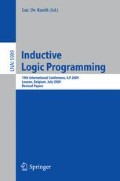Abstract
There exist large data in science and business. Existing ILP systems cannot be applied effectively for data sets with 10000 data points. In this paper, we consider a technique which can be used to apply for more than 10000 data by simplifying it. Our approach is called Approximative Generalisation and can compress several data points into one example. In case that the original examples are mixture of positive and negative examples, the resulting example is ascribed in probability values representing proportion of positiveness. Our longer term aim is to apply on large Chess endgame database to allow well controlled evaluations of the technique. In this paper we start by choosing a simple game of Noughts and Crosses and we apply mini-max backup algorithm to obtain database of examples. These outcomes are compacted using our approach and empirical results show this has advantage both in accuracy and speed. In further work we hope to apply the approach to large database of both natural and artificial domains.
Access this chapter
Tax calculation will be finalised at checkout
Purchases are for personal use only
Preview
Unable to display preview. Download preview PDF.
References
King, R.D., Whelan, K.E., Jones, F.M., Reiser, P.K.G., Bryant, C.H., Muggleton, S.H., Kell, D.B., Oliver, S.G.: Functional genomic hypothesis generation and experimentation by a robot scientist. Nature 427, 247–252 (2004)
Muggleton, S.H., De Raedt, L.: Inductive logic programming: Theory and methods. Journal of Logic Programming 19(20), 629–679 (1994)
Nienhuys-Cheng, S.H., de Wolf, R.: Foundations of Inductive Logic Programming. LNCS (LNAI), vol. 1228. Springer, Heidelberg (1997)
Plotkin, G.: Automatic Methods of Inductive Inference. PhD thesis, Edinburgh University, UK (1971)
De Raedt, L., Kersting, K.: Probabilistic inductive logic programming. In: Ben-David, S., Case, J., Maruoka, A. (eds.) ALT 2004. LNCS (LNAI), vol. 3244, pp. 19–36. Springer, Heidelberg (2004)
Thompson, K.: Retrograde analysis of certain endgames. ICCA Journal 9(3), 131–139 (1986)
Watanabe, H.: A Learning Theory Approach for Probabilistic Relational Learning (DRAFT). PhD thesis, Imperial College London, UK (2009), http://www.doc.ic.ac.uk/~hw3/thesis.pdf
Author information
Authors and Affiliations
Editor information
Editors and Affiliations
Rights and permissions
Copyright information
© 2010 Springer-Verlag Berlin Heidelberg
About this paper
Cite this paper
Watanabe, H., Muggleton, S. (2010). Can ILP Be Applied to Large Datasets?. In: De Raedt, L. (eds) Inductive Logic Programming. ILP 2009. Lecture Notes in Computer Science(), vol 5989. Springer, Berlin, Heidelberg. https://doi.org/10.1007/978-3-642-13840-9_24
Download citation
DOI: https://doi.org/10.1007/978-3-642-13840-9_24
Publisher Name: Springer, Berlin, Heidelberg
Print ISBN: 978-3-642-13839-3
Online ISBN: 978-3-642-13840-9
eBook Packages: Computer ScienceComputer Science (R0)

